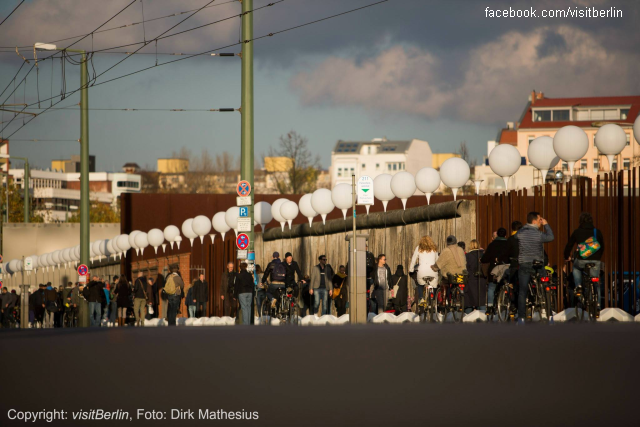Towards a New Cold War?
On November 9th, 25 years were celebrated since the fall of the Berlin Wall.
Warning: Trying to access array offset on null in /home/web/rri.ro/public/wp-content/themes/rri/template-parts/content.php on line 53

Warning: Trying to access array offset on null in /home/web/rri.ro/public/wp-content/themes/rri/template-parts/content.php on line 98
Corina Cristea,
05.12.2014, 13:33
On November 9, thousands of white balloons were released to the skies to Beethoven’s Ode to Joy in order to mark 25 years since the fall of the Berlin Wall, the re-unification of Germany and the end of the Cold War. Hundreds of thousands of people gathered before the Brandenburg Gate to attend the event, which was followed by a large open-air party in central Berlin. Chancellor Angela Merkel, who emerged as a leader from communist Germany, sent out a message of hope to people who are still under communist rule:
“That day went down in history as a memento of people’s will to liberate themselves, a will which shall never be broken. With the events of 1989, East German citizens overcame their fear of repression and backstage machinations”.
Raised in only day, on August 13, 1961 by the authorities of the former German Democratic Republic (GDR), the Berlin Wall was initially a barb wire fence, subsequently consolidated and expanded. For 28 years the Wall split Germany in two. The re-unification of the two sides occurred on October 3, 1990, 11 months after the Wall had fallen, under the pilling pressure of protesters. For over three decades attempts of escaping the communist Gulag included such resourceful methods as digging tunnels beneath the wall, linking high-tension cables and crossing to the other side hand-over-hand, or using hot-air balloons. These failed attempts resulted in over 128 people shot dead, 128 people who were just craving for freedom. The number of victims was much higher though, according to various research studies. In 1989, against the backdrop of radical political changes in Eastern Europe and the waning power of pro-Soviet governments, after weeks of protests, on November 9, authorities in Eastern Berlin lifted border-crossing restrictions. East Germans crossed in large numbers to Western Germany, tearing apart large hunks from the wall, and over the next weeks the authorities brought down whatever was left from the symbol that divided Europe.
Attending this year’s celebration was also the last Soviet leader Mikhail Gorbachev, one of the prime movers of the events of 1989, who stood besides the former leader of the “Solidarity” Polish Trade Union, Lech Walesa. “The world is on the brink of a new cold war, and some might say it has already begun”, Gorbachev warned, referring to the situation in Ukraine. Over the last months “confidence has been shattered”, and “there can be no security in Europe without the German-Russian partnership”, Gorbachev also said. In an interview to the Swiss Radio and Television Corporation he also stressed that, quote: “danger is imminent. They think they have won the Cold War. There is no winner. Everybody won, but right now they are embarking on a new arms race”. Asked whether he was referring to NATO countries, Gorbachev answered: “NATO is an instrument that is being used”. In his opinion, while dialogue between the world’s superpowers is increasingly deteriorating, the bloody conflicts in Europe and the Middle East are becoming a factor of concern. The 25 years that have passed since the demise of communism in Eastern Europe have also been subject to a public debate in Bucharest. Attending a conference on this topic were several former leaders of European states, who spearheaded the revolutions of 1989, but also the subsequent transition to democracy. An important topic on the political agenda was the crisis in Ukraine. Here is historian Zoe Petre, a former presidential advisor:
“Unfortunately, the last six months have prompted a review of concepts that have become too deeply rooted after 1989, concepts that were too optimistic and that survived the 2008 crisis in Georgia. The idea that Russia is just as any other country, maybe just a little bit more authoritarian, has turned out to be utterly false. I recall that when Obama became president, an important group of East-European leaders, led by Vaclav Havel, called on him to carefully re-examine and re-consider relations with Russia. Unfortunately, the response has been disappointing so far. As the English use to say, there’s no point crying over spilt milk. The real issue right now is that we are facing a certain kind of aggression”.
European Parliament president Martin Schulz has in turn warned against the risks of creating new borders in Europe as a result of military interventions, as it happens now in Ukraine. The unacceptable situation can only be solved at political level, Schulz added. “Whether we like it or not, Russia is a key power, a member of the UN Security Council. For that reason, we would be well advised to give an unequivocal undertaking to defend the territorial integrity of Ukraine, but at the same time to keep all channels of communication with Russia open”, the European Parliament president went on to say.





























